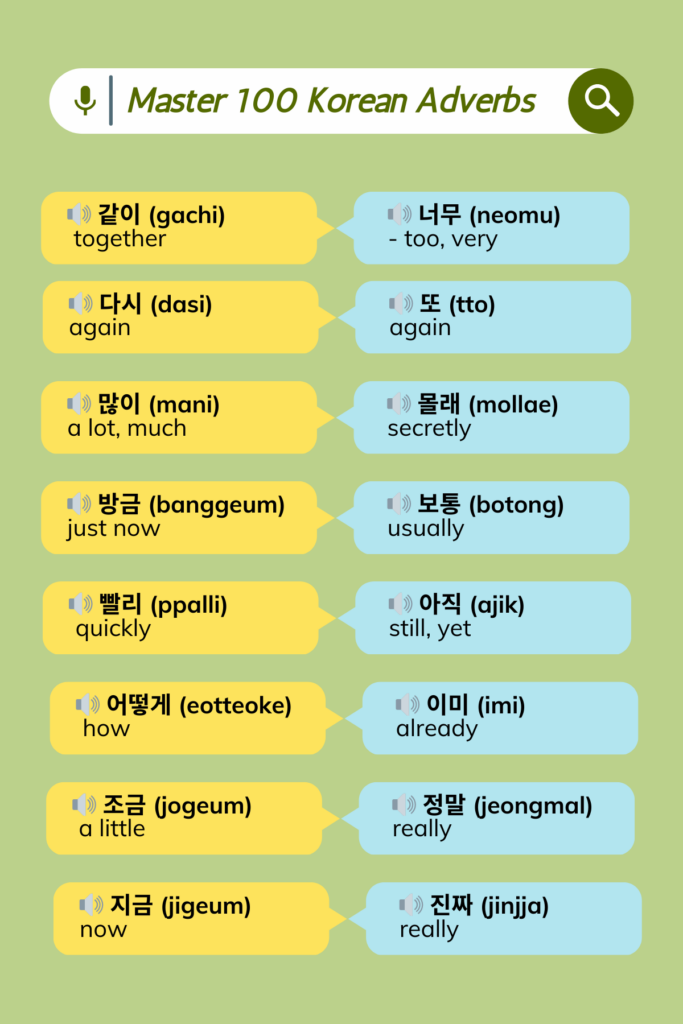
An adverb is a part of speech that describes either a verb, an adjective, or another adverb. They can also add description to phrases, clauses, or sentences.
Now, let’s see if you can spot an Korean adverb in a sentence:
🔊 나는 자주 운동해요.
[ naneun jaju undonghaeyo ]
“I exercise often.”
Were you able to spot the adverb? In that sentence, 자주 (jaju), which means “often,” is the Korean adverb. If you couldn’t find it this time, don’t worry.
Learning adverbs is essential when you want to enhance your Korean language skills. Adverbs help describe how, when, where, and to what extent something happens. Here’s a list of the 50 most commonly used Korean adverbs, complete with example sentences and romanization to help you pronounce them correctly.
List of Korean Adverbs
| 🔊 가끔 (gakkeum) – sometimes | 가끔 영화 보러 가요. (Gakkeum yeonghwa boreo gayo.) – Sometimes, I go to the movies. |
| 🔊 간단히 (gandani) – simply | 문제를 간단히 해결했어요. (Munje-reul gandani haegyeolhaesseoyo.) – I solved the problem simply. |
| 🔊 갑자기 (gapjagi) – suddenly | 갑자기 비가 내렸어요. (Gapjagi biga naeryeosseoyo.) – Suddenly, it started raining. |
| 🔊 같이 (gachi) – together | 같이 공부할래요? (Gachi gongbu-hallaeyo?) – Do you want to study together? |
| 🔊 계속 (gyesok) – continuously | 그는 계속 일을 했어요. (Geuneun gyesok ireul haesseoyo.) – He worked continuously. |
| 🔊 일부러 (ilbureo) – intentionally | 그가 일부러 문을 닫았어요. (Geuga ilbureo muneul dadat-seoyo.) – He intentionally closed the door. |
| 🔊 곧 (got) – soon | 곧 도착할 거예요. (Got dochakhal geoyeyo.) – I will arrive soon. |
| 🔊 그래도 (geuraedo) – nevertheless | 그래도 포기하지 마세요. (Geuraedo pogihaji maseyo.) – Nevertheless, don’t give up. |
| 🔊 그런데 (geureonde) – by the way | 그런데 지금 어디에 있어요? (Geureonde jigeum eodie isseoyo?) – By the way, where are you now? |
| 🔊 그러나 (geureona) – however | 그러나 그는 오지 않았어요. (Geureona geuneun oji anasseoyo.) – However, he didn’t come. |
| 🔊 그러니까 (geureonikka) – so | 그러니까 우리가 떠나야 해요. (Geureonikka uriga tteonaya haeyo.) – So, we have to leave. |
| 🔊 그리고 (geurigo) – and | 그리고 나는 그를 만났어요. (Geurigo naneun geureul mannasseoyo.) – And I met him. |
| 🔊 금방 (geumbang) – soon, right away | 금방 돌아올게요. (Geumbang doraolgeyo.) – I’ll be back soon. |
| 🔊 꼭 (kkok) – surely, certainly | 꼭 다시 만나자. (Kkok dasi mannaja.) – Let’s surely meet again. |
| 🔊 나중에 (najunge) – later | 나중에 얘기해요. (Najunge yaegihaeyo.) – Let’s talk later. |
| 🔊 너무 (neomu) – too, very | 너무 배가 고파요. (Neomu baega gopayo.) – I’m very hungry. |
| 🔊 다시 (dasi) – again | 다시 해봐요. (Dasi haebwayo.) – Try again. |
| 🔊 다행히 (dahaenghi) – fortunately | 다행히 사고가 없었어요. (Dahaenghi sagoga eopseosseoyo.) – Fortunately, there was no accident. |
| 🔊 당연히 (dangyeonhi) – naturally, of course | 당연히 가야죠. (Dangyeonhi gayajyo.) – Naturally, I have to go. |
| 🔊 당장 (dangjang) – immediately | 당장 와주세요. (Dangjang wajuseyo.) – Please come immediately. |
| 🔊 더 (deo) – more | 더 필요해요? (Deo piryohaeyo?) – Do you need more? |
| 🔊 또 (tto) – again, also | 또 만나요. (Tto mannayo.) – See you again. |
| 🔊 똑바로 (ttokbaro) – straight | 똑바로 가세요. (Ttokbaro gaseyo.) – Go straight. |
| 🔊 드디어 (deudieo) – finally | 드디어 끝났어요. (deudieo kkeutnasseoyo.) – Finally, it’s over. |
| 🔊 많이 (mani) – a lot, much | 많이 먹어요. (Mani meogeoyo.) – Eat a lot. |
| 🔊 모두 (modu) – all, everyone | 모두 모였어요. (Modu moyeosseoyo.) – Everyone gathered. |
| 🔊 몰래 (mollae) – secretly | 몰래 들어갔어요. (Mollae deureogasseoyo.) – I went in secretly. |
| 🔊 무조건 (mujogeon) – unconditionally | 무조건 따라와요. (Mujogeon ttarawayo.) – Follow me unconditionally. |
| 🔊 바로 (baro) – right away | 바로 갈게요. (Baro galgeyo.) – I’ll go right away. |
| 🔊 방금 (banggeum) – just now | 방금 도착했어요. (Banggeum dochakhaesseoyo.) – I just arrived. |
| 🔊 벌써 (beolsseo) – already | 벌써 집에 갔어요. (Beolsseo jibae gasseoyo.) – He already went home |
| 🔊 별로 (byeollo) – not really, not much | 별로 안 좋아요. (Byeollo an joayo.) – I don’t really like it. |
| 🔊 보통 (botong) – usually | 보통 몇 시에 자요? (Botong myeot sie jayo?) – What time do you usually sleep? |
| 🔊 부드럽게 (budeureopge) – softly | 부드럽게 말해요. (Budeureopge malhaeyo.) – Speak softly. |
| 🔊 분명히 (bunmyeonghi) – clearly | 분명히 말했어요. (Bunmyeonghi malhaesseoyo.) – I said it clearly. |
| 🔊 비슷하게 (biseutage) – similarly | 비슷하게 생겼어요. (Biseutage saenggyeosseoyo.) – They look similar. |
| 🔊 빨리 (ppalli) – quickly | 빨리 와요. (Ppalli wayo.) – Come quickly. |
| 🔊 사실 (sasil) – actually | 사실 나도 몰랐어요. (Sasil nado mollasseoyo.) – Actually, I didn’t know either. |
| 🔊 설마 (seolma) – surely not | 설마 그럴 리가요? (Seolma geureol rigayo?) – Surely not? |
| 🔊 솔직히 (soljikhi) – honestly | 솔직히 말할게요. (Soljikhi malhalgeyo.) – I’ll speak honestly. |
| 🔊 스스로 (seuseuro) – by oneself | 스스로 해보세요. (Seuseuro haeboseyo.) – Do it by yourself. |
| 🔊 아마 (ama) – probably | 아마 내일 갈 거예요. (Ama naeil gal geoyeyo.) – I’ll probably go tomorrow. |
| 🔊 아직 (ajik) – still, yet | 아직 준비 안 됐어요. (Ajik junbi an dwaesseoyo.) – I’m not ready yet. |
| 🔊 아주 (aju) – very | 아주 좋았어요. (Aju johasseoyo.) – It was very good. |
| 🔊 알고 보니 (algo boni) – as it turns out | 알고 보니 그는 나의 친구였어요. (Algo boni geuneun naui chinguyeosseoyo.) – As it turns out, he was my friend. |
| 🔊 약간 (yakgan) – slightly | 약간 어려워요. (Yakgan eoryeowoyo.) – It’s slightly difficult. |
| 🔊 어떻게 (eotteoke) – how | 어떻게 해요? (Eotteoke haeyo?) – How do you do it? |
| 🔊 얼마나 (eolmana) – how much | 얼마나 걸려요? (Eolmana geollyeoyo?) – How long does it take? |
| 🔊 엄청 (eomcheong) – extremely | 엄청 바빠요. (Eomcheong bappayo.) – I am extremely busy. |
| 🔊 여전히 (yeojeonhi) – still | 여전히 사랑해요. (Yeojeonhi saranghaeyo.) – I still love you. |
| 🔊 역시 (yeoksi) – as expected | 역시 잘했어요. (Yeoksi jalhaesseoyo.) – As expected, you did well. |
| 🔊 예전에 (yejeone) – previously | 예전에 여기 살았어요. (Yejeone yeogi sarasseoyo.) – I used to live here. |
| 🔊 오래 (orae) – long | 오래 기다렸어요. (Orae gidaryeosseoyo.) – I waited for a long time. |
| 🔊 완전히 (wanjeonhi) – completely | 완전히 잊어버렸어요. (Wanjeonhi ijeobeoryeosseoyo.) – I completely forgot. |
| 🔊 왜 (wae) – why | 왜 그랬어요? (Wae geuraesseoyo?) – Why did you do that? |
| 🔊 위험하게 (wiheomhage) – dangerously | 위험하게 운전하지 마세요. (Wiheomhage unjeonhaji maseyo.) – Don’t drive dangerously. |
| 🔊 이따가 (ittaga) – later | 이따가 전화할게요. (Ittaga jeonhwa halgeyo.) – I’ll call you later. |
| 🔊 이미 (imi) – already | 이미 알고 있어요. (Imi algo isseoyo.) – I already know. |
| 🔊 이제 (ije) – now | 이제 가야 해요. (Ije gaya haeyo.) – I have to go now. |
| 🔊 일단 (ildan) – first of all | 일단 시작해요. (Ildan sijakhaeyo.) – First of all, let’s start. |
| 🔊 자주 (jaju) – often | 자주 만나요. (Jaju mannayo.) – Let’s meet often. |
| 🔊 잠시 (jamsi) – for a while | 잠시 기다려 주세요. (Jamsi gidaryeo juseyo.) – Please wait for a while. |
| 🔊 정말 (jeongmal) – really | 정말 예뻐요. (Jeongmal yeppeoyo.) – You are really pretty. |
| 🔊 조금 (jogeum) – a little | 조금만 기다려 주세요. (Jogeumman gidaryeo juseyo.) – Please wait a little. |
| 🔊 조용히 (joyonghi) – quietly | 조용히 해 주세요. (Joyonghi hae juseyo.) – Please be quiet. |
| 🔊 지금 (jigeum) – now | 지금 가야 해요. (Jigeum gaya haeyo.) – I have to go now. |
| 🔊 직접 (jikjeop) – directly | 직접 말해요. (Jikjeop malhaeyo.) – Tell me directly. |
| 🔊 진짜 (jinjja) – really | 진짜로요? (Jinjjaro-yo?) – Really? |
| 🔊 천천히 (cheoncheonhi) – slowly | 천천히 걸어요. (Cheoncheonhi georeoyo.) – Walk slowly. |
| 🔊 최대한 (choedaehan) – to the maximum | 최대한 노력해 볼게요. (Choedaehan noryeokhae bolgeyo.) – I will try my best. |
| 🔊 충분히 (chungbunhi) – sufficiently | 충분히 설명했어요. (Chungbunhi seolmyeonghaesseoyo.) – I explained sufficiently. |
| 🔊 하루 종일 (haru jongil) – all day | 하루 종일 일했어요. (Haru jongil ilhaesseoyo.) – I worked all day. |
| 🔊 함께 (hamkke) – together | 함께 놀아요. (Hamkke norayo.) – Let’s play together. |
Conclusion
Mastering these commonly used Korean adverbs will significantly improve your fluency and understanding of the language. Practice using them in sentences, and soon, you’ll notice your Korean becoming more natural and expressive. Happy learning!
Table of Contents

